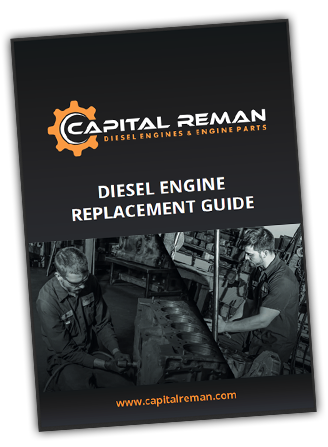Benefits of Diesel Engine Remanufacturing For Equipment Rental Companies
 For equipment rental companies fleet management is an integral part of the business. Inventory fleet management can encompass everything from depreciation, product life cycle, maintenance and repair costs, fuel expenses and inventory age. When it comes to diesel engines, equipment rental companies manage a lot them. Everything from generators and portable light towers to excavators and boom lifts all have diesel engines that power the equipment. For example, when a rental generator or box truck is nearing the end of its useful life the company might be left with a tough decision to replace the equipment with a brand new unit, phase out the product line or sell it at auction. However, many companies are now following a new approach by seeking out engine remanufacturing to breathe new life in old engines.
For equipment rental companies fleet management is an integral part of the business. Inventory fleet management can encompass everything from depreciation, product life cycle, maintenance and repair costs, fuel expenses and inventory age. When it comes to diesel engines, equipment rental companies manage a lot them. Everything from generators and portable light towers to excavators and boom lifts all have diesel engines that power the equipment. For example, when a rental generator or box truck is nearing the end of its useful life the company might be left with a tough decision to replace the equipment with a brand new unit, phase out the product line or sell it at auction. However, many companies are now following a new approach by seeking out engine remanufacturing to breathe new life in old engines.
Diesel engine remanufacturing consists of taking old or damaged engines and remanufacturing the hard internal parts back to the original factory specifications. The process isn’t new and has been around for close to 100 years but has gained popularity with businesses looking to cut costs while maintaining quality. The benefits to diesel engine remanufacturing are numerous from a business perspective including lower costs, reduced downtime, greater resale of older equipment as well as being an environmentally friendly option. This article will describe the advantages of remanufactured diesel enginesfor equipment fleet companies.
1. Less Costly Option
The most obvious factor when choosing a remanufactured diesel engine is cost. On average a remanufactured diesel engine will cost 2x-3x less than a new engine from a dealer. Many older engines are grandfathered into the Tier Rating System enacted by the EPAand do not require emissions abatement technology. A brand new Tier 4 engine will have to be configured and engineered to fit the older application. This is a complicated and expensive process described further in bullet point three. In addition to installation complexity issues, after treatment costs such as DEF Fluid (Diesel Exhaust Fluid) can add up for sizeable fleets. Diesel Exahust Fluid is required for all newer engines. If not properly filled the engine will eventually go into limp mode and then shutdown completely until more fluid is added. For newer engines emissions technology such as the SCR (Selective Catalytic Reduction) and DPF (Diesel Particulate Filter) can add sizeable maintenance costs to a fleet. The emissions technology, albeit better than 10 years ago, is still the number one maintenance issue with new engines. Emissions technology is still in its infancy and is very complicated. For rental equipment engine abuse is common. Customers will run equipment at full load and ignore temperature or oil pressure gauges. Going with an older mechanical engine without complicated emissions technology takes one less potential point of failure out of the equation. This translates into savings from maintenance issues and long downtimes.
2. Greater Resale Valve
 Depreciation is a considerable factor when examining the health of a rental fleet. Older equipment that can be salvaged through diesel engine remanufacturing will increase its valve. The value recouped will not be 100% of its original sale price but usually 50% or more. On average, diesel engine remanufacturing can extend an engine’s life by as much as 5-8 years. That adds up to greater profitability in the long run versus the initial upfront cost of remanufacturing. It really is a prudent financial decision to remanufacture an engine rather than to sell it “as is”. If a rental company chooses to sell their newly remanufactured equipment the resale value will be considerably more than if they chose to scrap the piece of equipment or sell it as “used”. Fleet managers will have to determine if the value of remanufacturing outweighs the costs. If an engine is nearing the end of its product life cycle, is fuel inefficient or costs the company more than it brings in than it makes sense to liquidate that piece of equipment from inventory.
Depreciation is a considerable factor when examining the health of a rental fleet. Older equipment that can be salvaged through diesel engine remanufacturing will increase its valve. The value recouped will not be 100% of its original sale price but usually 50% or more. On average, diesel engine remanufacturing can extend an engine’s life by as much as 5-8 years. That adds up to greater profitability in the long run versus the initial upfront cost of remanufacturing. It really is a prudent financial decision to remanufacture an engine rather than to sell it “as is”. If a rental company chooses to sell their newly remanufactured equipment the resale value will be considerably more than if they chose to scrap the piece of equipment or sell it as “used”. Fleet managers will have to determine if the value of remanufacturing outweighs the costs. If an engine is nearing the end of its product life cycle, is fuel inefficient or costs the company more than it brings in than it makes sense to liquidate that piece of equipment from inventory.
For countries with less strict emission laws it is difficult to sell new Tier 4 Final Diesel Engines due to two factors: lack of maintenance service centers and diesel fuel availability. In many countries around the world there are few established service centers for new diesel engine technology. Service programs, software and trained technicians are usually years behind the manufacturing source of the product. Many equipment rental companies are hesitant to install new technology without the proper support in case something goes wrong. Secondly, new Tier 4 Final powered engines require ultra-low sulfur diesel fuel to operate efficiently. The availability of this fuel is still scarce around much of the planet. Without the ultra-low sulfur diesel option the diesel particulate filter can clog easily and cause substantial regeneration issues within the engine.
3. Reduced Downtime
 Diesel engine remanufacturing takes roughly1- 2 weeks depending on the production queue of the facility. During the busy time of the season (Fall and Winter) lead times can be between 2-5 and weeks. Many construction and agriculture companies upgrade their fleets during the Winter after running all Summer. It is best to plan accordingly if you need to remanufacture an engine.
Diesel engine remanufacturing takes roughly1- 2 weeks depending on the production queue of the facility. During the busy time of the season (Fall and Winter) lead times can be between 2-5 and weeks. Many construction and agriculture companies upgrade their fleets during the Winter after running all Summer. It is best to plan accordingly if you need to remanufacture an engine.
With that in mind a brand new Tier 4 Final diesel engine can take rental companies months to configure with the older equipment application in question. Newer engines include emissions technology, fluid lines and various configurations of mounting racks that have to be taken into account during the engine swap. Putting a newer engine in an older piece of equipment will also take a high level of technical skill as the ECM of the engine must be properly synced with the computer in the equipment.
For a rental companies the downtime equates up to less revenue and additional engineering costs. If a fleet consists of 75 box trucks that need an upgrade those costs are are significant. Remanufactured engines are an upgraded version “refreshed” version of the engine already in use. The transition time to swap a reman engine in to the original equipment is minimal if at all.
4. More Environmentally Friendly
The demand for environmentally friendly options in business has been on the rise in recent years. Many companies are opting to use sustainable practices as part of their overall branding and marketing campaigns. Remanufactured diesel engines offer a way for equipment rental companies to “go green”. According to Andy Machin of Perkins Pacific, “Approximately 73 percent of an old engine can be salvaged during the remanufacturing process saving millions of pounds of waste out of landfills.”
Consequently new engine production requires a substantial amount of energy for the production and shipping process. Remanufactured or recycled engines use typically 80%-85% less energy than with new engine production. Each component of a new engine has to be forged out of new metals, plastic and synthetics. For equipment rental businesses remanufactured engines offer both the opportunity to practice environmentally conscience ways while saving the company money and downtime.




